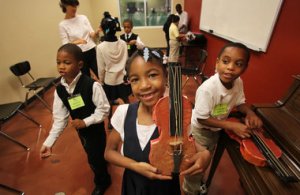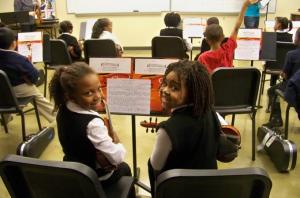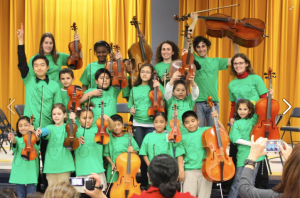The Many Faces of El Sistema in the USA. Part 2 of a Series
by Annie Gordon
Part One of this series explored the philosophy of El Sistema, a classical music education movement spawned in Venezuela as a means of uplifting communities through classical music education provided to youth. In this second installment is the story of two specific programs in the U.S. Each has contributed to its community in a distinctive and impactful way.
Cleveland: El Sistema@Rainey
In the summer of 2012, I had the opportunity to work with El Sistema@Rainey, a program founded one year earlier in inner-city Cleveland by Cleveland Orchestra violinist Isabel Trautwein. The after-school and summer program collaborates with The Rainey Institute, a community center that provides arts education for Cleveland youth, in order to fill its orchestra. El Sistema@Rainey has a pool of prospective students from community members already connected with the Rainey Institute, and The Rainey Institute expands its potential offerings to its population served, specifically with the addition of two 25+ piece orchestras.
With the help of the Rainey staff and administration, Trautwein recruited her orchestra from students and parents who were already accustomed to attending the program after school and during the summer, and she also had the advantage of Rainey’s existing infrastructure of administration and facilities. The collaboration had one final benefit beyond a pool of prospects and the capacity to teach them. The Rainey Institute had an established culture of expecting integrity from students, a standard that includes respect for peers, adults, and their surroundings and that emphasizes the importance of a healthy learning environment.
A special feature of Trautwein’s Sistema is a class called “Power Hour.” Power Hour provides enhanced instruction for students of the orchestra who wish to further their musical skills beyond the 2 hours of orchestra rehearsal. The extra time usually happens during the normal break time or after rehearsal is over, and all students are free to attend or not at their leisure. During my time at Rainey, there was a core group of students who chose to attend Power Hour and who went above and beyond what was expected of them. Consequently they were rewarded with much praise, extra attention, and a special feature performance in the end-of-the-summer concert. The students’ self-motivation, discipline, and desire to excel were truly inspirational.
Cincinnati: MYCincinnati
I met cellist Laura Jekel in 2003 as my music camp counselor, and she has been a mentor, role model, friend, and colleague to me ever since. Through her I came to my initial awareness and appreciation for El Sistema. Jekel, along with violinist Eddy Kwon, founded the El Sistema program MYCincinnati in 2011, and it is a free after school youth orchestra located in Price Hill.
Last year, Jekel and Kwon converted an old Price Hill home into a beautifully welcoming musical space for the orchestra to rehearse and for concerts to be performed. Through grants and donations, they have fully furnished the space with chairs and music stands, as well as hosted numerous guest artists who hold mini-residencies at MYCincinnati and work closely with the students. The program is partnered with Price Hill Will, a community development corporation. The partnership, like that between Trautwein and The Rainey Institute in Cleveland, is a symbiotic relationship. In return for a profound and long-lasting contribution to the community landscape, MYCincinnati receives administrative support and office space. According to Jekel, MYCincinnati was welcomed thanks to the known success of El Sistema across the world, and her program offered the prospect of a beneficial and impactful addition to the neighborhood.
Jekel describes a distinctive attribute of her program, which exemplifies the flexibility of the El Sistema philosophy. At MYCincinnati students who act out do not face the typical consequences of a modern age classroom. Excepting extreme cases, if a student is disruptive or distracted they will not be sent out of the room or asked to sit away from the group. Instead, they are constructively reprimanded and asked to remain in the orchestra and to focus even harder on the task at hand – playing music. Jekel and Kwon hope for and expect that kids behave and focus on the music because they are intrinsically motivated to do so and not because an adult is coercing them to participate. The students have a choice: to miss an opportunity to learn and be a part of the ensemble, or to participate productively and make music. Jekel says it’s a long road, but despite the challenges, she and Kwon are experiencing positive results.
Articles of Related Interest from The Muse Dialogue:
“Classical Musician’s Paradigm Shift” by Annie Gordon
“The Pavlova Effect: An Argument for Equal Access to Arts Education” by Michelle Van Doeren
“The Seriousness of a Child at Play” by Andrew Swensen












